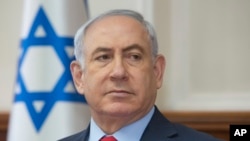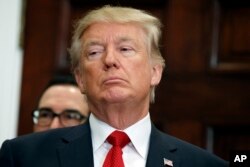Israel was upbeat about U.S. President Donald Trump's anticipated announcement on Friday of major steps against the international nuclear deal with Iran, but voiced doubt that the tougher tack by Washington could turn around Tehran.
While the White House's distaste for the 2015 pact may be sweet to the ears of Israeli Prime Minister Benjamin Netanyahu, his government is mindful of the limits of any unilateral U.S. action in the face of dissent from other big power signatories.
Some Israeli officials quietly question whether Washington has the will to follow through, noting what they deem insufficient U.S. efforts to stem the entrenchment in next-door Syria of Iran-allied forces helping Damascus in the civil war.
Trump was expected to say in a 1645 GMT speech that he will not re-certify the nuclear agreement in light of Iran's ballistic missile projects and involvement in regional trouble-spots. That would give the U.S. Congress 60 days to decide whether to reimpose sanctions on Tehran that were suspended in return for it rolling back technologies with nuclear bomb-making potential.
Netanyahu spokesmen declined to comment on the pending speech. A veteran Israeli cabinet minister from Netanyahu's Likud party sounded cheered by Trump's resolve, but appeared to note the depth of partisan rifts around the U.S. administration.
"The outcome that could happen, and this is the only positive outcome we can see at this stage, is that Congress manages to come together around new, significant sanctions," the minister, Tzachi Hanegbi, told Tel Aviv radio station 102 FM.
"(That) will confront a lot of gigantic international companies which are today streaming to the Iranians ... with a dilemma of having to choose between the Iranians and trading with the world's biggest economy, which is the United States."
"Fix it on nix it"
Netanyahu has lobbied hard against the Iran deal, delivering a speech in Congress shortly before it was signed that angered then-U.S. President Barack Obama.
Addressing the U.N. General Assembly last month, Netanyahu urged world powers that negotiated the deal to "fix it or nix it." He called specifically for cancelling a core "sunset clause" that removes caps on Iran's nuclear projects after a number of years.
Asked about the sunset clause in the radio interview, Hanegbi gave no indication Israel believed it would be reviewed. He noted the resistance that Trump's new measures faced from European powers, Russia and Iran, which has threatened to quit the nuclear deal if the U.S. imposes new sanctions against it.
Iran, Hanegbi assessed, "will not yield at all - period - in other words, not just not within 60 days, but neither within 60 months or 60 years, because they really do not believe that the world will reverse course. They look rather mockingly at the United States."
But he added, "If the United States reverses course and begins a process of building delegitimation for the agreement, it could be that the world, part of the West, will join it in a process that could take time ... There is still a long way to go until the dangers of this deal pass."
There has been dissent within Israel over the nuclear deal, with several Netanyahu ex-advisers grudgingly coming out in its favor. His former defense minister, Ehud Barak, told the New York Times on Wednesday: "Like many Israelis, I think the Iran deal is a bad deal. But it is a done deal."
Barak warned that any U.S. withdrawal from the agreement would not be followed by other world powers and could prompt Iran - which denies seeking nuclear weapons - to work on a bomb.
Hanegbi dismissed such predictions as "nonsense".
"Iran has no interest in withdrawing from the agreement (because that) would immediately unite Russia and China to the United States" against it, he told the radio station. He noted - as have U.N. nuclear inspectors - that the Iranians "have not budged a hair's breadth from their commitments under the deal".






